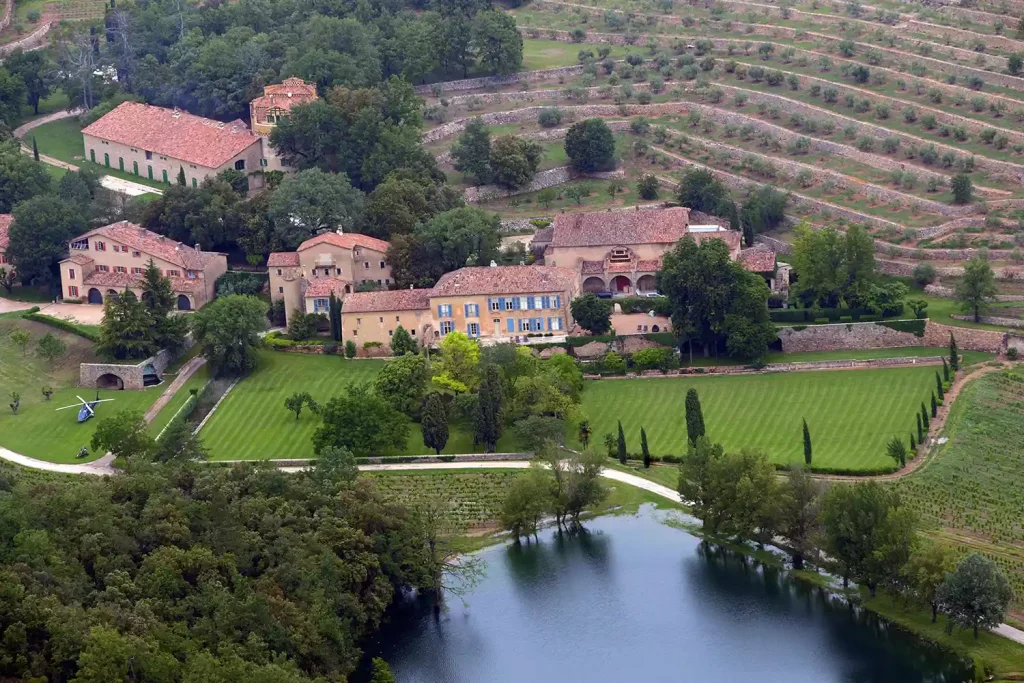Brad Pitt Accuses Angelina Jolie of Unauthorized Winery Sale, Files $35 Million Lawsuit Exposing Heated Legal Battle Over Château Miraval
In a heated legal confrontation that has captured widespread attention, Brad Pitt has filed a lawsuit against his ex-wife Angelina Jolie, demanding $35 million in damages over the controversial sale of their shared French winery, Château Miraval. The latest developments, revealed through court documents submitted on October 29, 2025, shed new light on the intensity and complexity of a dispute that extends far beyond the usual acrimony of celebrity separations.

The saga centers on Château Miraval, a once-idyllic winery and estate in the south of France, acquired by the former power couple in 2008 for around $28.4 million. The property, which gained additional fame as the site of their 2014 wedding, became not just a romantic landmark but a luxury wine brand with a valuation soaring into the hundreds of millions. What was once a symbol of unity now serves as a battleground for bitter legal clashes between Pitt and Jolie.
According to the newly unveiled lawsuit, Brad Pitt alleges that Angelina Jolie sold her stake in the Miraval winery in 2021 without his knowledge or consent. He claims this act breached the couple’s agreement that neither party could vend their interest in the winery without the other’s approval. Pitt’s legal team argues that Jolie’s unilateral decision caused substantial damage to the business, which he quantifies at $35 million.
Central to this legal dispute are emails exchanged between the legal teams of both stars, recently entered as evidence. One pivotal message, dating back to late 2023, came from Angelina Jolie’s attorneys and highlighted a particularly contentious claim. The email stated, “The burdensome nature of any production is a matter of Mr. Pitt’s own creation—he is suing Ms. Jolie for $35 million in damages.” This pointed remark underscores the deep-seated frustrations simmering on both sides.
Further emails suggest Jolie’s team believes Pitt’s lawsuit has forced him to bear the cost and effort of producing documentation that would either substantiate or refute his damages claim. Meanwhile, Pitt contends that the stability and operation of Miraval have been compromised by Jolie’s actions, arguing for compensation that would reflect the fiscal and reputational harm caused.

Jolie, on her part, has maintained that she possessed the right to sell her share independently, as it was held through her ownership of Nouvel LLC, a holding company managing her interest in Château Miraval. Her legal representatives have also asserted that certain communications in the case are privileged, involving legal strategies that should remain confidential, adding layers of complexity to the already protracted litigation.
This courtroom drama is not merely a battle over assets—it reflects years of intertwined personal and professional histories between Pitt and Jolie, once Hollywood’s golden couple. Their relationship, which began in the early 2000s and turned into marriage in 2014, ended in separation in 2016, but the entanglements of shared property have continued to bring new chapters of conflict.
Château Miraval holds undeniable sentimental and financial value for both. It symbolizes a period of their lives when dreams converged, yet now embodies the challenges of disentangling mutual investments post-divorce. The sale of Jolie’s stake to Tenute del Mondo, a subsidiary of the Stoli Group, was meant to be a strategic business decision, but it has been transformed into a legal powder keg.
Observers note that such disputes over high-value assets are not uncommon in celebrity separations, but the underlying human stories often get lost amidst media frenzy. For Pitt and Jolie, this case raises questions about trust, communication, and control after the dissolution of a complex personal partnership.

Experts in entertainment law see this lawsuit as a critical test of contractual obligations in the management of luxury brands co-owned by former couples. The outcome could set precedents for how such assets are handled, especially when agreements about sales and consent are disputed.
Amid the legal filings and courtroom exchanges, what remains clear is that both parties are deeply invested—not just in the monetary stakes but in protecting their legacies tied to Château Miraval. As the litigation continues, the public watches closely, aware that behind the headlines lie nuanced issues of business ethics, contractual law, and personal loss.
The renewed legal activity also signals that this dispute is unlikely to resolve quickly. Each new filing, email, and declaration adds fuel to a contentious process that has already spanned years. For Brad Pitt and Angelina Jolie, the stakes are enormous—not only in dollars but in how history will remember their shared endeavors and struggles.
The $35 million lawsuit is emblematic of the broader difficulties faced by celebrity couples navigating the aftermath of separation while preserving financial interests that have real-world implications far beyond Hollywood.
In conclusion, Brad Pitt’s pursuit of damages over the Château Miraval sale by Angelina Jolie highlights a fierce legal battle underscored by unresolved tensions and complex business entanglements. As both sides prepare for what promises to be a protracted courtroom fight, the story serves as a potent reminder of the blurred lines between personal and commercial lives in the world of the rich and famous.


